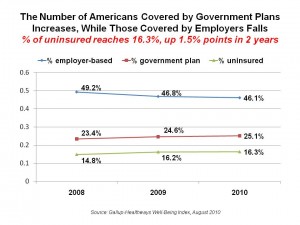 In 2010, fewer Americans are receiving health coverage from employers. At the same time, more health citizens are being covered by government programs, including Medicaid, Medicare, military and veterans’ benefits. The proportion of people on government health insurance rolls increased from 22.5% in January 2008 to 25.4% in August 2010. This represents an increase of about 13%.
In 2010, fewer Americans are receiving health coverage from employers. At the same time, more health citizens are being covered by government programs, including Medicaid, Medicare, military and veterans’ benefits. The proportion of people on government health insurance rolls increased from 22.5% in January 2008 to 25.4% in August 2010. This represents an increase of about 13%.
The proportion of Americans covered by employers fell from 50% to 45.5%, a 9% decline. Thus, the number of U.S. health citizens getting absorbed into government-sponsored health programs is growing faster than the loss in the ranks of people covered by private sector health insurance.
Data from The Gallup-Healthways Well-Being Index for August 2010 illustrates the continued erosion of employer-sponsored health benefits, the cornerstone of the U.S. health insurance system.
The Index tracks U.S. residents throughout the year, surveying at least 1,000 U.S. adults every day (except holidays) on both landline and cell phones.
 Health Populi’s Hot Points: 13% more Americans are covered by government health insurance than when the recession began. But so has the number of uninsured Americans increased.
Health Populi’s Hot Points: 13% more Americans are covered by government health insurance than when the recession began. But so has the number of uninsured Americans increased.
There will be critics who believe that the percentage of health citizens under government health insurance programs is “too high.” What would the right proportion be? As the provisions of the Affordable Care Act (ACA) are rolled out, the percentage of American health citizens covered by public sector health insurance will increase, by design. Now 1 in 4 people are covered by government-sponsored health care; in a decade, that proportion will increase to something closer to 1 in 2, as 30 million more Americans are absorbed into State Medicaid programs. At the same time, several years’ worth of Baby Boomers will enter Medicare.
The Index is a composite of 7 areas including emotional health, physical health, access, workplace environment, daily “pulse,” life evaluation, and healthy behaviors. All seven of these areas dropped in the past month — the largest decline being in the component of healthy behaviors. In the long end-tail of the recession, it’s not only private health coverage that’s getting hit — it’s healthy living. In that category are smoking, eating healthfully, including lots of fruits and vegetables in one’s diet, and taking regular exercise. The health impact of this decline will negatively impact future Indices in the areas of emotional health and physical health…a cycle which then exacerbates health spending. The long recession isn’t good for either business or health.




 Thank you, Trey Rawles of @Optum, for including me on
Thank you, Trey Rawles of @Optum, for including me on  I was invited to be a Judge for the upcoming
I was invited to be a Judge for the upcoming  For the past 15 years,
For the past 15 years,